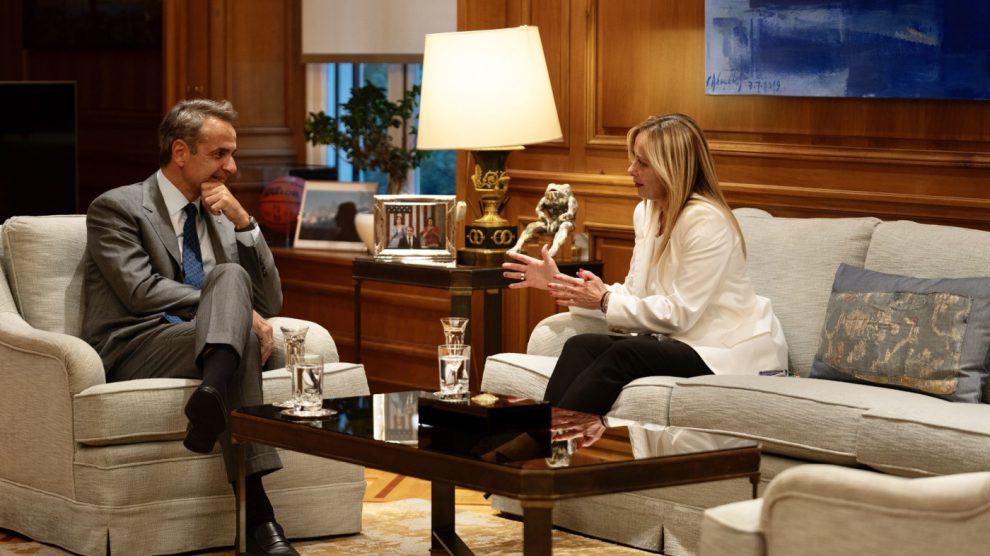Rome and Athens talk. On Thursday evening, Italian Prime Minister Giorgia Meloni landed in Athens for a bilateral meeting and working dinner with her Greek homologue Kyriakos Mitsotakis. The leaders’ goals are aligned on multiple fronts, and it shows – with the two agreeing to stand together on several key dossiers, including migration management and the EU’s fiscal rules.
- The two leaders agreed to convene the Supreme Council for Bilateral Cooperation in Italy in the first half of 2024.
- On the backdrop, talks between their respective European parties – the European Conservatives and Reformists, led by PM Meloni, and the European People’s Party, to which PM Mitsotakis belongs to – have been intensifying in view of a possible alliance in the European Parliament – starting with the election of the next European Commissioner.
Migration matters. Both Greece and Italy are at the forefront of the growing migratory wave, with fluxes across the Mediterranean tripling over the past two years. The two PMs agreed that the EU must more forcefully recognise the requests of Mediterranean countries on migrant management – acting in a comprehensive manner, i.e. pairing a more efficient support and reallocation mechanism to increased cooperation with African countries of origin and transit.
- PMs Meloni and Mitsotakis could join efforts to pressure the Commission to release the funds it had granted to Tunisia (spearheaded by an Italian effort), consisting of €105 million to contrast irregular migration and €150 million in budgetary aid, plus the prospect of a long-term €900 million loan.
- All the funds remain frozen in Brussels for the time being.
- In the meantime, negotiations are still underway on how to implement the new migratory framework that EU countries agreed on in early June. It includes more support to border countries and a more robust relocation system, but this, too – seeing as the matter is a longstanding EU sore point – is proceeding slowly.
Reforming EU fiscal rules. Another dossier the two PMs discussed on Thursday were the complex negotiations in Brussels on the new Stability and Growth Pact, the collection of fiscal rules EU countries must abide by. PM Meloni believes in the need for more flexibility and that it would be best to decouple the green and digital transitions, as well as defence investments (and support to Ukraine), from the calculation of the debt-to-GDP ratio.
- The current rules dictate that this metric must be reigned in aggressively, which places great stress on highly-indebted countries such as Italy and Greece. Still, they have been suspended since the pandemic to allow for State intervention – and historically rigorous Germany was behind over half of all of the EU’s approved State aid in the past years.
- Nevertheless, European fiscal hawks (including Germany) oppose the ideas of flexibility and decoupling. To counter their pushback, Rome is trying to weave alliances with Paris (the second-biggest beneficiary of loose State aid rules), Madrid and other Southern European capitals, including Athens.
Cooperation in energy, defence, transport. Economic ties between Greece and Italy are healthy, with economic interchange rising from €9 billion to over €11 billion between 2021 and 2022. Energy is the main voice in this chapter, as the two countries share electrical and gas pipeline interconnections – and both operate in the gas-rich Eastern Mediterranean area.
- Basically all of Italy’s main energy and power delivery companies operate in Greece, and some are involved with their Greek counterparts to understand how to bring methane (and later, green hydrogen) from the basin to the European mainland.
- Italian shipbuilder Fincantieri is also participating in a tender to build the Hellenic Navy’s corvettes (a deal worth roughly €2 billion), while transport company ATM is debuting in the Greek market with a €250 million contract to manage the country’s first automatic metro in Thessaloniki.





